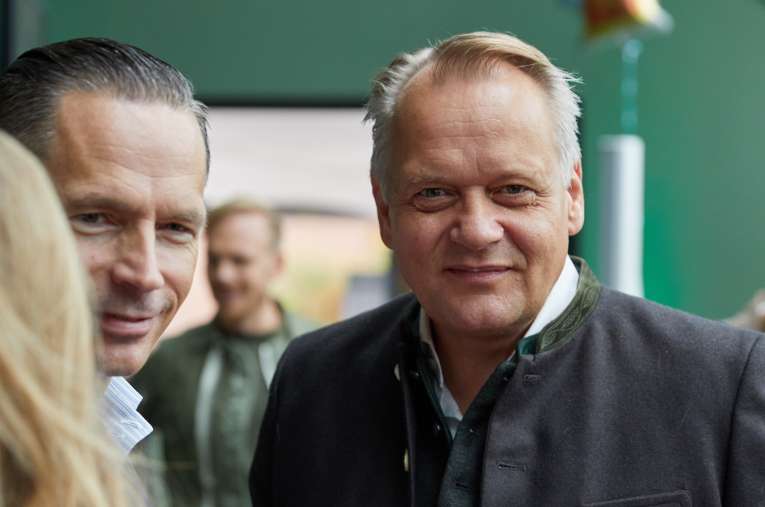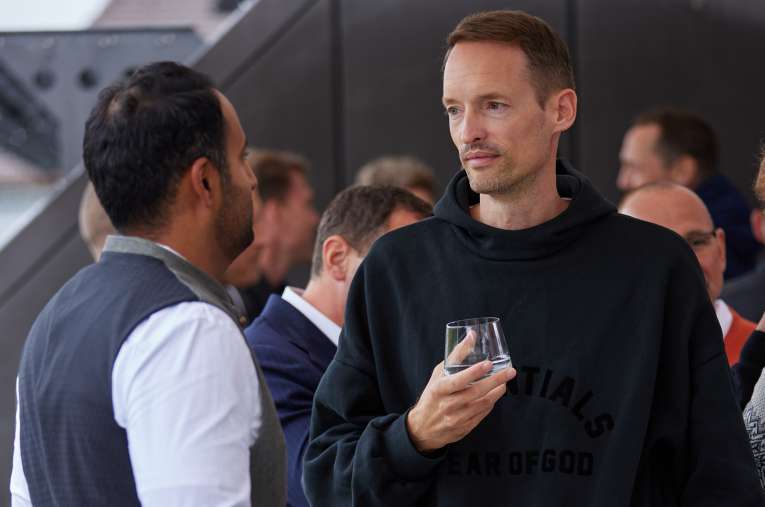THE SHIFT GUIDE.
A vibrant collection of speakers content that brings together the
results of questioning, interviewing, and shaping a community.
PLEASE SAVE MAY 2ND & 3RD, 2024 FOR THE UPCOMING SHIFT DAYS
SHIFT regularly investigates where the greatest shifts are occurring, identifying the changes that will transform our working lives. This time, the organizers had assembled a roster of speakers that zoomed in to the
very latest trends, individual destinies, and specific markets. From these tiny pixels, a sharp and precise image emerged: the trend towards dehabitualization among large parts of the population demands constant
flexibility as well as blurring the boundaries between the real and digital worlds. Amid these developments, the maxim is: the closer to people, the better.
This SHIFT event, the seventh in the series, was also a premiere – it was the first SHIFT to be held entirely during the Oktoberfest. At last! Study hard, party hard! That hardly made the team’s job easier, as co-founder and co-organizer Nick Hartmann admitted at the beginning. Many hotels were full, many flights were changed. Nevertheless, most of the speakers managed to make it, and all the seats and the traditional beer garden-style tables set up at the back were packed.The last SHIFT #6 in May 2023 had outlined general trends, concentrating on aspects of German domestic policy and geopolitics as the main topics of debate. This time, however, the focus was on the tangible impact of change on individuals, companies, and niche markets. A search for guidance in the post-COVID era, still beset by uncertainty and unpredictability. In times like these, it is particularly vital to avoid slavish reliance on facts and figures and instead to address emotional worlds in concrete terms.
The longing for familiarity in our immediate environment is so great that even virtual influencers are increasingly in demand, as Kim Haußer observed in the SHIFT Briefing by Avantgarde. It’s important to understand apparent contradictions and to realize that almost every trend has its counter-trend. For example, many
young people have embraced ultra-healthy eating, yet have also taken up smoking.
So the main issue is: what is the most important consideration for a brand seeking to establish emotional loyalty? Can I appeal to everyone, or should I focus on a specific group in order to maintain credibility? The impact of these fundamental questions naturally extends well beyond Gen Z. How much can a customer in, say, China affect our own consumer behavior and our business strategies? A slew of highly individual and personal reasons are increasingly becoming the drivers of purchases––or decisions not to purchase.
As expected, an especially emotional viewpoint was presented by the marketing experts from Ottobock. This cutting-edge orthopedic technology company is laser-focused on the wellbeing of its users. A masterclass from LinkedIn likewise set out ways of engaging followers’ emotions. LinkedIn’s introduction of the “smiley” quick response is proof that emotions can’t simply be hung up on a peg with the coats. But what kind of content is most effective at getting a response on LinkedIn? The company’s inhouse strategists, Henrik Ihlo and Niklas Falzer, have the answer: be authentic, don’t show off, better post an original thought than any old selfie for the billionth time, and reveal your human side––that makes it easier to appeal to others’ human side in turn.
Further emotionally based contributions came from three German entrepreneurs who have built new lives in China. Attending the event in a live stream from offices near the Oriental Pearl Tower in Shanghai were Christian Stipp from Avantgarde, online market expert Damian Maib, and hotel manager Christian Humbert. They reported with relish how China is overtaking Germany on the inside––or, in fact, already did long ago, despite its draconian lockdowns and concerning politics. The pace of this development can be neatly summed up by the example of the Shanghai-Peking express: always on time, with an average speed of 380 km/h.
Observing this vast market is rather like looking into our own future. But it’s more than that; as local populations change their consumption habits, companies will increasingly find themselves compelled to hand greater autonomy to their local offices if they wish to remain flexible.
And what state of mind does a top manager find himself in when he has spent 18 years in the glare of the spotlight, and then suddenly has to quit? Absolutely fine, according to football legend Oliver Bierhoff. He compared his time as a pro footballer with his stint as a football manager, and reached the conclusion that being a manager is more of a challenge. The UEFA Euro 96 champion also pleaded passionately for German football to make a decision: to pledge more commitment to the billion-euro football market––or not?
Food is a further emotionally charged topic. Not merely because steaks and burgers are tasty favorites for many people, but because what we all eat has global consequences. Jan Wilmking’s idea of “spinning” meat from plant fibers in a textile-like process could spark a miniature cultural revolution and decimate global populations (that’s populations of cattle and pigs, of course!). Other speakers on the agenda were drawn from the immediate vicinity of Hartmann Campus, in both geographical and entrepreneurial terms. Carsten Hendrich reported on Breuninger’s cross-media strategy and explained why creating a link to the company’s digital experience is leading to the opening of new physical flagship stores. Michaela Pichlbauer, Chair of the Rid Foundation for the Bavarian Retail Industry, a new SHIFT sponsor, described the type of companies that have funding prospects and drew attention to the Foundation’s valuable insights in predicting the journey that retail will take in the future.
A macroeconomic viewpoint was also provided by a deep dive into the world of venture capital, here presented from a very human perspective by Project A co-founder Florian Heinemann. Heinemann believes that Germany should devote more courage and, in tandem, more financial resources to investing in startups to boost the dynamism of the economy.
The leitmotif of almost every speaker was also a constant topic on the Internet: the rapid development of AI and how to deal with it. In her Briefing talk, Kim Haußer noted that around 75 percent of all Internet content will be AI-generated in the next three years. However, Carsten Hendrich from Breuninger believes that leadership of a company, with all the human-based decisions that involves, will remain in human hands. Also a topic that lends itself to emotional debate. And by the way––this text was written by a human.
All in all, a wealth of information and different viewpoints to digest before a visit to the Oktoberfest, arranged by the tireless Hartmann team. As co-founder Simone Hartmann summed up, “This time our event and the content of the sessions delivered a really emotional take on the fact. In other words: close to the human element.”
On all channels
Carsten Hendrich
Chief Brand Officer Breuninger
Marc Schumacher
SHIFT moderator and CEO Avantgarde Group
Despite being pronounced dead, city centers are still very much alive––at least, where Breuninger is concerned. 2023 saw the fashion and lifestyle company opening two flagship stores in the hearts of Munich and Hamburg. The question put by SHIFT presenter Marc Schumacher to Brand Officer Carsten Hendrich was: So what do Breuninger’s strategists know that others don’t? The answer: smart integration of the physical and digital worlds delivers the best of both those worlds.
The SHIFT Community’s Oktoberfest visit is nearing, and the rickshaw shuttles are already on their way. The guests heading for the Theresienwiese fairground will pass close by Breuninger’s new 12,500-square-meter flagship store. Wearing traditional Bavarian dress, Carsten Hendrich addresses the future-facing conference on a topic that is precisely the most striking feature of the streets between hartmann campus and the pedestrian zone of Sendlinger Strasse: blending modernity and tradition.
Breuninger is a great fit here, and not only because of its URL. In recent years the Stuttgart-based company has carved out a new position for itself with great success. The reinvention naturally proceeded in well-judged steps, backed up by experience as a key ingredient. Physical stores do indeed create added value––but the company can also look back on 15 years of eCommerce. What sounds like a contradiction in terms is actually the catalyst that bucks the trend and awakens city centers to new life. Hendrich points out that Breuninger already has its customers in Hamburg and Munich, and now the issue is to provide those customers with an integrated service.
.At first, it sounds like a step backwards. In the past, companies or individual flagship stores would augment their physical presence by adding online shopping. Now that sequence is reversed. But take a closer look. Strictly speaking, the concept is actually customer-centric, with cross-media presence as the only next logical step. The old mindset that the two areas are completely separate will soon be consigned to history––and probably in more locations than major cities.
Breuninger recently celebrated its birthday in Düsseldorf, with new collections, a fashion runway spanning the Kö-Bogen water feature, and hundreds of visitors and spectators. But as Hendrich points out, “An anniversary in Düsseldorf is no longer a purely in-person event; we share the content digitally, too. We’re moving away from the idea of a pure event channel over here, a purely digital channel over there. This new perspective generates synergies, and this is the way we now need to think.” Content is appropriately designed and curated for every channel along the customer journey, enabling both younger and older target groups to be met where they are. And while Breuninger is already a well-established “cultural asset” in Stuttgart, it can then devote its energy and attention to innovation elsewhere.
But the times when oldies did their shopping in bricks-and-mortar stores and young people went online are gone. Hendrich talks about a “renaissance of social contact” among younger generations, affirming: “This target group has rediscovered its appreciation of the physical.” His findings go hand in hand with the recognition that the storytelling associated with a product or company needs to be expanded, first and foremost within the meaning of events. Sharing in an awesome experience is a hot trend at the moment.
And being well-dressed is likewise.
In cities like Munich, it’s clear what that means. Of course, Breuninger invites its partners and associates to the Oktoberfest, as well as to the Swabian equivalent on its home ground––the Canstatter Wasen, where the company rents the entire Göckelsmaier beer tent. “We will certainly need to sell more experiences. But customers will pay for experiences––provided they are of premium quality,” confirms Hendrich.
To conclude, let’s take a look at the world of luxury fashion: “Brands are reinventing themselves,” says Breuninger’s Brand Officer. Like Gucci, which has struck out in a completely new direction. “The goal is to absorb cultural trends, but also to determine the true sources of our appreciation.” In other words, where are the customers that will enable the company to continue growing over the medium term? New customers alone will not be sufficient to deliver the desired performance indicators.”
With 13 physical stores, online stores in nine countries, and a range covering over 1,500 brands and designer names, Breuninger is confident of the strength of its position. But not in the sense of staying still. The market demands a perpetual flow of response to the latest trends, the latest wishes. “I’ve long wondered how retail can constantly reinvent itself,” says Hendrich. His conclusion? “I think it’s always been part of Breuninger’s DNA to adjust and change, to identify customers’ needs, and to be agile in our digital operations. Breuninger’s always had the ability to do that in a physical context.”

This year, Breuninger is celebrating 15 years of e-commerce. Munich and Hamburg are the markets we chose for our new bricks-and-mortar stores. But we also go places where the customers are already. We’ve grown synergistically, which is different from the logic of purely physical stores.
Our aim is to create a true synthesis of our channels. An anniversary in Düsseldorf is no longer a purely in-person event; we disseminate the content digitally, too. We’re moving away from the idea of an event channel over here, a purely digital channel over there, to create overarching synergies. So the idea along the customer journey is far more about assigning the appropriate importance to each channel and selecting appropriate content in line with that. Our younger target group is regaining an appreciation of physical stores. There’s a renaissance of social contact, of sharing memories and experiences.
AI is nothing new, but at the end of the day, it’s all about creativity. You’ll never be able to manage a brand using AI. It’s certainly really useful in many areas, but does it achieve across-the-board added value? That’s where I have my doubts.
Carsten Hendrich
Chief Brand Officer Breuninger

People are prepared to pay sky-high prices for experiences. We’ve been talking a lot about equity, private equity, and banks, but as far as venture capital goes, I think we all have a little knowledge––and that, as the saying goes, is a dangerous thing.
Marc Schumacher
SHIFT moderator and CEO Avantgarde Group

The venture capital field isn’t about picking good companies. It’s about picking good companies with genuine hit potential. There has to be a value of over 500 million involved, or the whole thing isn’t worth it.
Germany has the lowest number of professional investors in venture capital. That’s a bitter pill. But venture capital can have a major impact on prosperity. Venture capital doesn’t just make a few people wealthier. It can achieve an enormous amount throughout society as a whole. Five percent of deals generate around 95 percent of returns. And international statistics have shown that 50 percent of early-phase investments deliver returns that are lower than the original investment amount.
Every investor in the scene needs a specific USP. Just because a business angel has a lot of money doesn’t mean they automatically get the good deals.
Florian Heinemann
Founding Partner Project A Ventures

The Foundation emerged from premium bed and bedding company Betten Rid. Günther Rid’s aim was to make a contribution toward anchoring heterogeneity and stability in the economy, and also to help shape city centers. The topics we are discussing today were already on his radar in the mid-1980s.
We are constantly launching new ideas and projects, and seeking other collaboration partners in other forms of trade. As part of that, we came across hartmann consultants. Not only because we can see them from our terrace––but because they do good work.
Michaela Pichlbauer
Chair Günther Rid Foundation for the Bavarian Retail Industry

Oliver Bierhoff
former German national team footballer and DFB manager
A football career is more charged with emotion, and somehow more attractive. But working as a manager is more wide-ranging and more satisfying. And achieving top performance as a manager is definitely more challenging. Given the quality of our football in Germany, being knocked out of two World Cups in the preliminaries should never have happened. Of course it weighs on my mind. I would never expected it to go that far.
Things are always set up as polar opposites: commerce and marketing on the one hand, and fan satisfaction on the other. But they don’t need to be mutually exclusive!
I think that here in Germany, we often want something but aren’t willing to take other things on board as part of getting it. It doesn’t work. Everything has its price, in sport as much as in industry.
At my first Italian club, Ascoli, I thought I’d better show some modesty by turning up in a small car. So I turned up in a Peugeot. But I got a sound tongue-lashing from my fan club, who told me I had to drive a Mercedes! They want to see you in your full status. That’s rather different in Germany. A third career? Well, I’ve still got the appetite for getting something off the ground. But I’d like to tackle something new in finance, business, or sport.
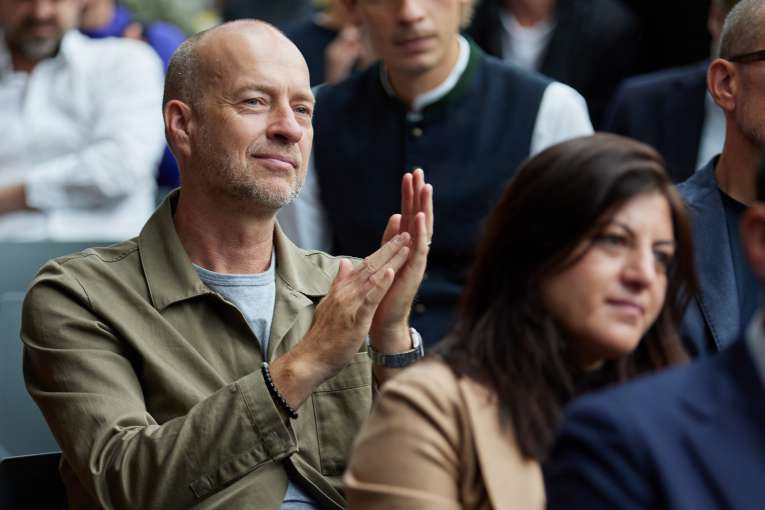
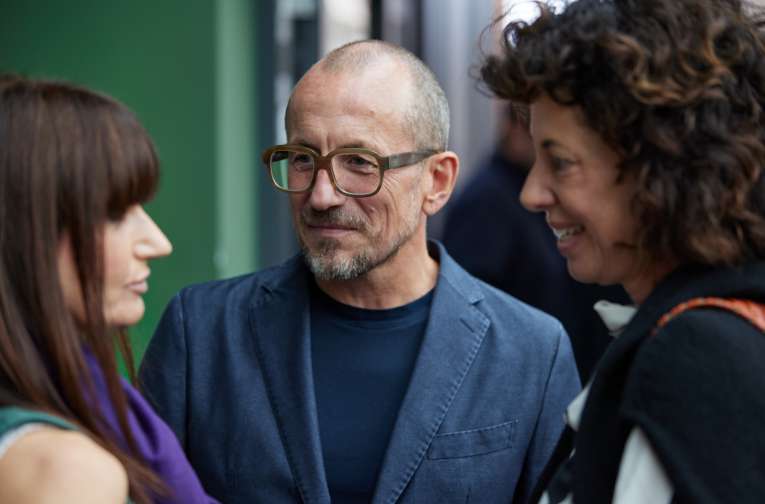

Damian Maib
Founder Genuine
China has an enormous technological lead. If you haven’t been here in the last five years, it’s just incredible. All payments are made by QR code. It takes four hours to get to Peking––a distance of 1200 kilometers. I don’t carry cash or keys; I pay for everything with my phone. You can’t buy wallets here any more.
If you’re searching for a product, you don’t start with Google, but go to a shopping platform. Everything is heading towards social commerce. Take TikTok, for example. With an annual growth rate of 300 to 500 percent, it’s gobbling up market share in social commerce.
“In China for China“ is a phrase we hear more and more often. Brands have to become more independent, with solid teams on the spot.
Christian Humbert
General Manager
The Ritz-Carlton Shanghai
Before the pandemic, people spent a lot on consumer goods with the show-off factor. Lining up three bottles of Dom Pérignon in front of them, “I’ve got money, look at me!” That’s changed. People in China don’t need any more show-offs. It’s no longer about “Hey, look what I can afford!”, but about getting something for the money. An experience, say, or really top-class food. We see a lot of families traveling with three generations. Family has taken on enormous importance, and money is spent on the family.

Christian Stipp
Managing Partner Avantgarde China Ltd
Of course it resonates here when German politicians are reported making negative comments about China. The Chinese press always retaliates in kind.
In Germany we’re much too slow at greenlighting innovations and improving processes that can get us from A to B faster. Here, you order something and have it in your hands 20 minutes later. Because there’s a service mindset and a whole lot of people on e-scooters that bring you whatever you’ve ordered, from toilet paper to antibiotics.
Chinese car brands were the first to realize that they needed to follow Elon Musk. There will be three or four brands that are successful in Europe because they have a good portfolio and plenty of reach, and have improved their design.
In the coming years, more international top management will come back to China. I see that as an opportunity for international brands to retain their profitability over here. After all, you have to be here to understand the market properly.
The market has changed enormously over the past 20 years. It’s the contrasts that make this country so exciting. Cities have seen particularly dramatic changes in the wake of the pandemic. The pandemic is definitely continuing to resonate for far longer than in other countries.
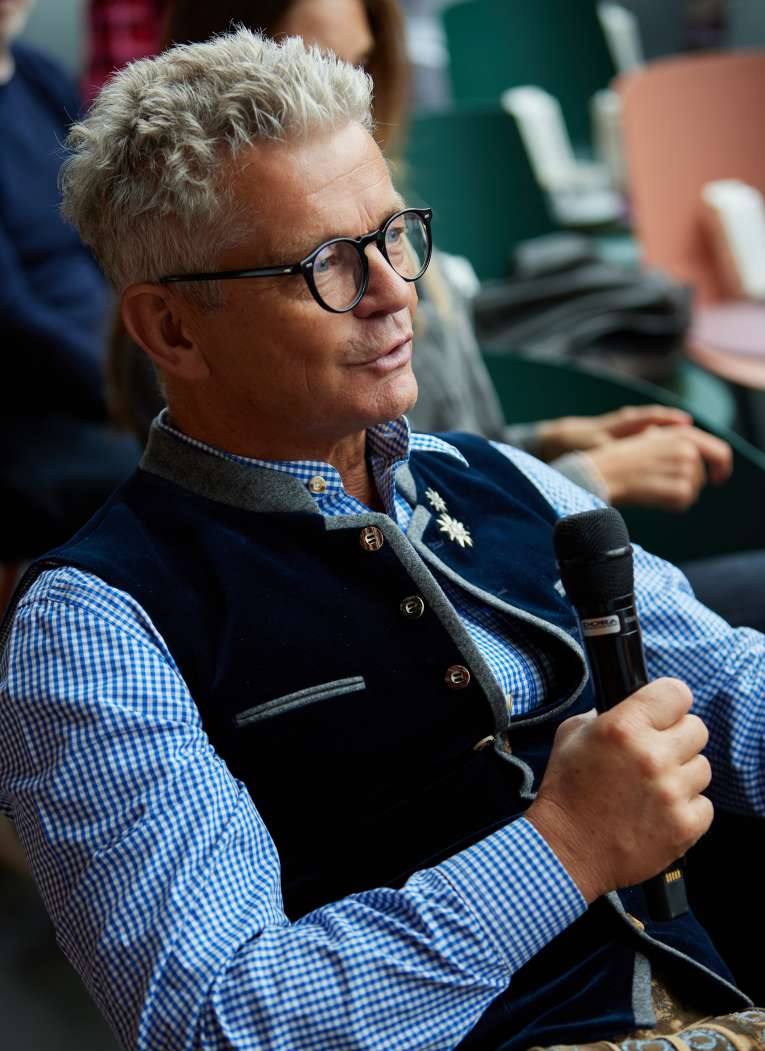
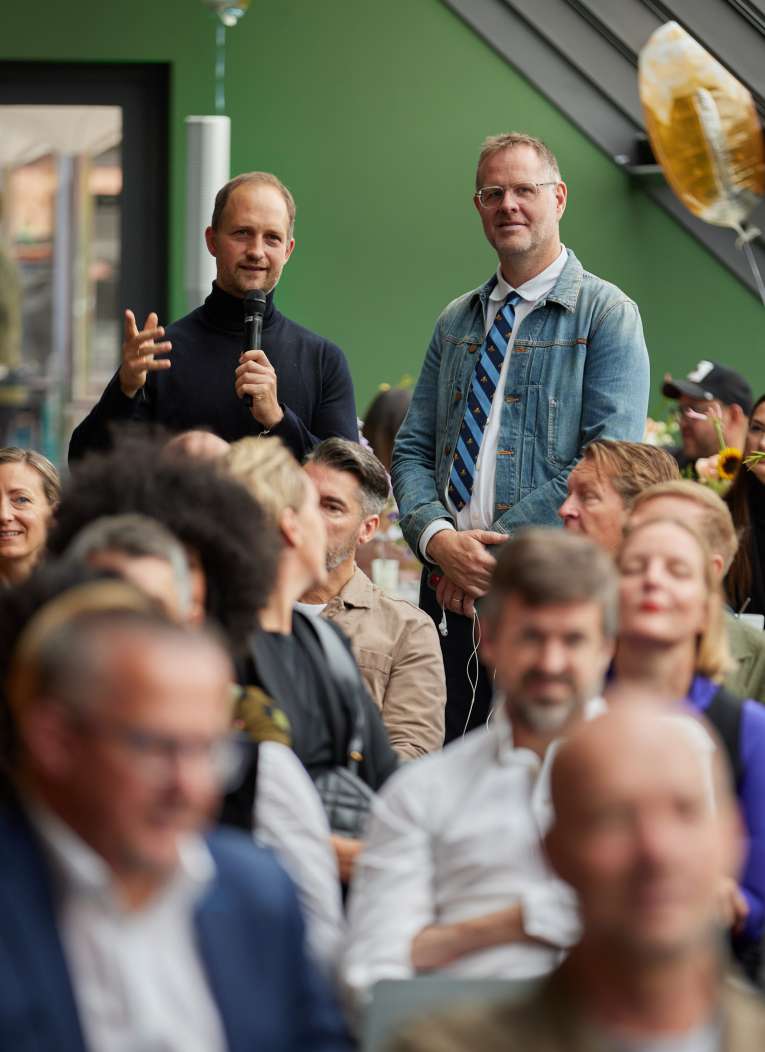

China is a career boost. All the executives I know who have gone through China got a promotion. In my eyes, it is especially a personal opportunity. It is important to learn about the culture before you come here, instead of staying in your Western comfort zone.
Foreigners have difficulties mingling with locals … but actually, it is not because of the locals. It is not rejection or exclusion. I thinks it’s more because of the willingness to stay in your comfort zone. Reaching out takes effort. It’s not easy to learn Mandarin. I find the Chinese in general to be very open, very curious about foreigners. They learn from the rest of the world. That is one of the key factors for their success. The big driver of consumption has been the rise of the middle class. Based on everything we know, this middle class will keep rising over the next 10, 15 years. Investing is a very strong bet on that future.
All the trends support the impression that there is a rise in Chinese brands and in localization. It shows the need for Western companies to integrate local consumers’ aspirations. So you need to react very fast. And for that, your China team needs to be given a certain level of autonomy.
Emmanuel Hemmerle
Founder of Emmanuel Hemmerle Ltd Shanghai
Firing up the barbecue––for the climate
Jan Wilmking
Co-Founder Project Eaden
Although still “half-baked”, a new idea is making investors’ mouths water. Ex-Zalando manager Jan Wilmking talks to SHIFT about his process for producing meat in the same way as spinning textiles. If Project Eaden succeeds in tickling people’s tastebuds, it could spark a food revolution.
As even the producers of The Matrix were well aware, a good steak is so irresistible that it could imperil the very existence of humanity. In a scene from the classic 1999 movie set in the virtual world, computer whiz Cypher cuts up a juicy, but non-existent steak, takes a bite, and says, “Ignorance is bliss,” before betraying his crew. But what if that level of bliss could be achieved by eating a real, but fake steak?
Jan Wilmking is working on this minor miracle, which––if he succeeds––will make a contribution toward saving the world. The name (and the webpage photo) of Project Eaden, which he co-founded in Berlin, were deliberately chosen to allude to the biblical scale of the enterprise. The vast consumption of meat throughout the world is deeply rooted in cultural considerations, but is simultaneously a “huge problem,” even greater than generally assumed. There’s not only the enormous volumes of water consumed by livestock farming, and the colossal amounts of methane emitted by cattle in particular. In global terms, the perceived trend toward vegetarian or vegan diets is simply negligible to non-existent. According to recent studies, even Generation Z eats more meat than previously assumed.
It’s a bleak scenario. A global population rising from eight to ten billion, plus higher per capita incomes in densely inhabited emerging countries, all add up to the need for more and more meat.
“The market for meat is set to grow by 70 percent over the next 20 to 25 years,” warns Wilmking. But this market is already far, far larger than previously assumed. The global beef industry alone generates revenues of 300 to 400 billion euros per year.
A market of this incredible size offers plenty of opportunities––and perspectives for investors. While Eaden has no marketing department as yet, the project initiators have already launched a great marketing idea: they posted a photo showing a real steak alongside one of their virtually indistinguishable fake steaks. The photo went viral, and significant funds in the high single-digit millions were raised. Project Eaden now has 30 employees, the majority of them mechanical engineers and food technologists. The idea behind the project is to produce plant-based meat from natural fibers in a process akin to spinning the yarn for sweaters or pants.
At present, it has reached the refining stage to create slimmer and slimmer fibers. But when compressed and grilled, the fibers already deliver an impressive taste experience even at the current state of progress. According to Wilmking, that is; Eaden beef has not yet reached production-readiness.
The process of “spinning” fibers could galvanize the food tech market, where meat consumption has previously been dominated by two strategies. One is the replacement of classic foods by less harmful or less unhealthy foods, like seaweed-based burger patties. The second is to cultivate single animal cells in the laboratory, a complex and expensive procedure. It is still unclear which strategy will ultimately win out. Perhaps both?
Wilmking’s background is in textiles and consumer goods. From being General Manager at Zalando, in his early forties he fell into a state of “existential crisis,” as he describes it, and left the company. While fully aware that he cannot deprive people of the chance to eat delicious meat, he now believes there is a huge opportunity for socially acceptable change. If the process can be scaled up appropriately, it could also give a boost to Germany as a center of engineering. The “spinning” method needed to create the new meat still depends on the perfection of the machinery that will enable mass production.
Like a fashion show presenting new trends, all will depend on the taste appeal.
And that taste is already being worked on by the designers. “We take the building-blocks that go to make up flavoring substances, and reassemble them to create flavours. It’s a whole science in its own right,” explains Wilmking. The project has already begun to tackle pork and chicken flavors. With the right mix of plant proteins, Eaden meat delivers good nutritional value. But its market-readiness will depend on further financing.
Despite his work, Wilmking affirms, “I’m still going to eat meat”–– by which he means meat from animal origins. His primary goal is to provide alternatives and reveal new pathways out of a looming crisis. The SHIFT organizers say, “Bon appétit!”

There are around 1.5 billion cows on the planet. They all emit methane, a highly powerful climate gas. Cows occupy third place as greenhouse gas emitters, after the USA and China The cattle industry, excluding pigs and poultry, generates more emissions than the entire transport sector. And the market for meat is set to grow by 70 percent over the next 20 to 25 years.
Meat is a muscle, and muscles are made up of fibers. We can use fiber technology to build those muscle fibers, 71 micrometers across––thinner than a human hair. When that muscle meat is put on a barbecue, it sizzles away and caramelizes, and stays really juicy. Even if not everything is perfect at this stage, our technology works!
I’m still going to eat meat. None of us will turn into perfect people. But our goal is to create solutions that make it easier for us to create a better mix and help us all to become a little happier.
Jan Wilmking
Co-Founder Project Eaden

This year’s big headline is dehabitualization. We’re living through a phase of developing new habits and new routines. We’re actually seeing the formation of these new structures as they emerge. Today it’s much more difficult to get a handle on consumers. Given this, it’s vital for brands to identify ways of connecting, by meeting extremes––on both sides––at their level or focusing on one extreme.
The truth is that by 2026, 90 percent of all online content will be generated by AI. And we have to accept that. In Germany, the attitude toward virtual influencers is still colored by skepticism. Brands that work with AI face the requirement that they don’t lie about it, but use it transparently.
Kim Hausser
Trends & Innovation Consultant Avantgarde

We are truly globally distributed, with 950 million members in 200 countries and operating in 26 languages. 77 percent of our members are outside the USA. Alongside our job postings, we’ve also become a huge content ecosystem. Critical examination of topics will always be weighted highly by our algorithm.
Henrik Ihlo
Director Enterprise Client Solutions LinkedIn DACH

Take a look over there at Munich Cathedral. Its towers are around 100 meters high. That’s roughly equivalent to the content people swipe through on their phones in a day. That means whatever you post, you’ve got an incredible amount of competition. The goal is to get all those swiping thumbs to stop. And to achieve it, you need to be authentic and emotional. Content works when it meets human emotion.
Niklas Falzer
Senior Content Solutions Consultant LinkedIn DACH & BENELUX
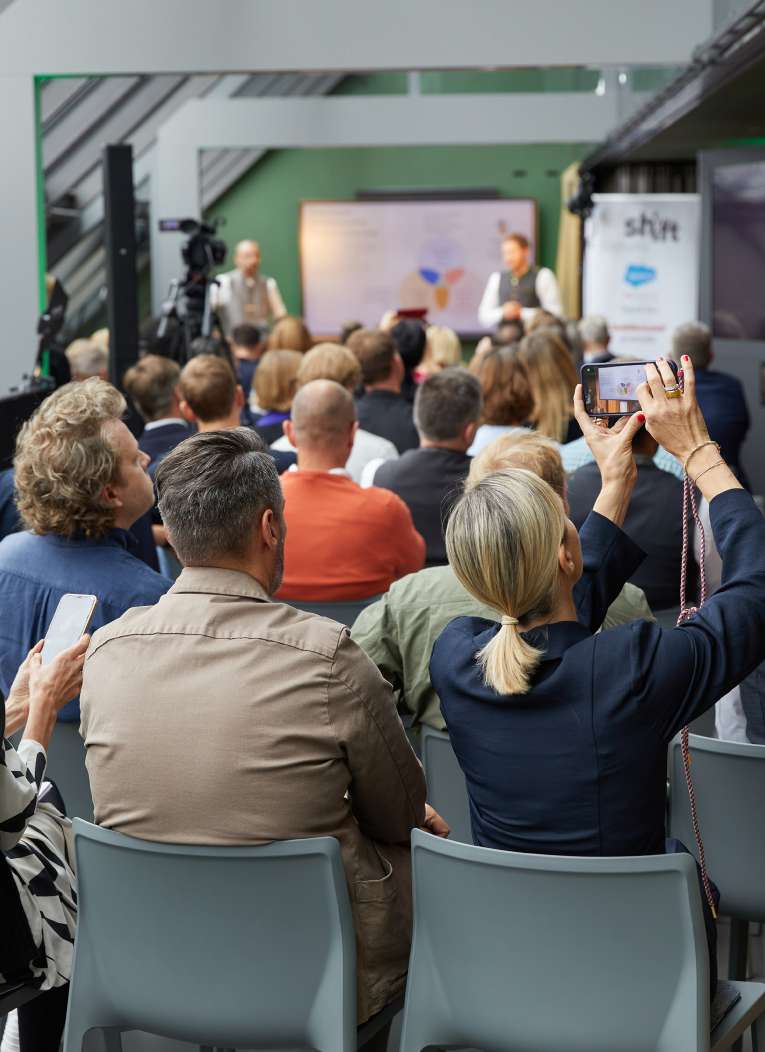
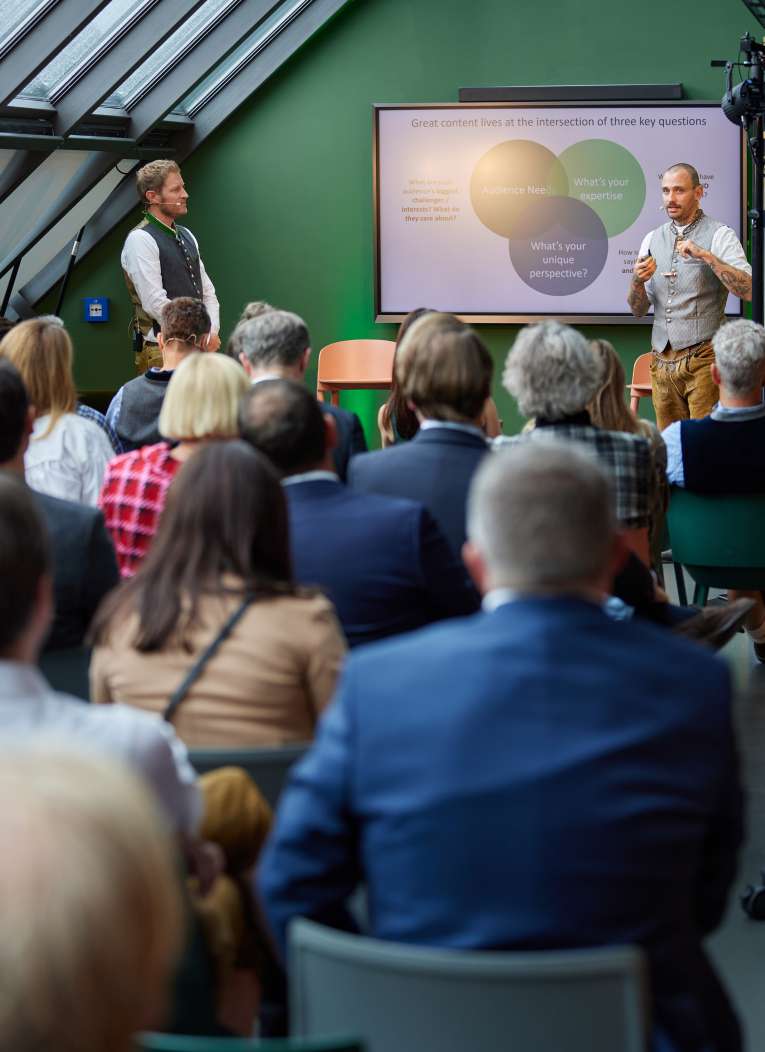
Moving
mountains
Martin Wider
Vice President Global Marketing & Global
Head of Customer Experiences Ottobock
Oliver Adekunle
Head of Marketing Technology Ottobock
Thanks to high-tech products from Ottobock, many influencers with disabilities can step into the spotlight as a “cyborg.” But the revolutionary marketing concept of these prosthetics specialists from Lower Saxony aims at so much more than human/machine fusion. By creating a fusion of digitalization and social commitment, companies can generate added value while also improving society.
Take Sophia, who can now run again––and fast!––despite her multiple sclerosis. And then there’s Gina Rühl. After losing her left arm in a motorbike accident, the ‘one armed princess’ became the Miss Germany runner-up, quickly amassed 500,000 Instagram followers, and now posts on the channel about her life. Or what about Hari Magar, the first double amputee in the world to conquer Mount Everest?
These and many more similar stories occupy center stage––quite literally––at Ottobock. Of course, the photos and videos posted by the users showcase their Ottobock products, their prostheses and suits. And of course, their purpose is also to raise Ottobock‘s profile and maintain its market leadership. But the marketing strategy pursued by the company––which was founded in 1919 to support the multitudes of war wounded in that era––also has a completely different goal: “Our marketing is also aimed at changing the discourse on society’s treatment of people with disabilities,” affirmed Ottobock’s Vice President Global Marketing/Global Head of Customer Experience Martin Wider in a SHIFT talk on Thursday evening.
The event with Martin Wider and Oliver Adekunle was the kick-off for the conference and thus, by its very nature, offered no conclusion. While this manufacturer of prostheses. exoskeleton braces, and wheelchairs seeks to tell fascinating stories, it makes no claim to knowing their endings.
The goal is, some day, for people with disabilities to become completely ordinary parts of society, enjoying completely normal lives. True, some of them––like Heinrich Popow––have set their sights rather higher. The Paralympics world record holder for the 100-meter sprint and long jump (12.11 seconds and 6.77 meters respectively) is the perfect ambassador for boosting self-confidence. “Technology? Super! We have awesomely good products,” says Adekunle. “But technology isn’t everything. It’s about supporting you to resume your rightful place in society––whether you want to become a top athlete, an artist, or a bank clerk.”
Many Ottobock product users become integral elements of the company’s marketing, echoing the way in which a prosthesis becomes an integral part of its user. It’s as much a coming together of technology and humanity as it is a blend of social integration and added value. “We’re a gang,” says Wider with a grin, referring to the group currently engaged in “transforming the entire company.” All have a background in consumer goods and initially came up with the idea of the aligning the company’s marketing message with the “count us in” message of activism that calls for inclusion, not exclusion.
Of course, their ambassadors are happy to be part of the process, taking their stories to the world through their millions of followers because Ottobock has enabled them to live more fulfilling lives. They communicate their message through social media and take part in TV productions and YouTube documentaries; they strive to give courage to others after a life-changing incident, or seek to restore the self-confidence people need to believe in a normal, happy life.
The process naturally leverages different factors from those that are in play to market a chocolate bar or fashion shirt. For Ottobock’s customers, the products they use are absolutely essential, even life-saving. But the way Ottobock’s reshaped marketing meets people where they are––whatever form that process takes––can provide any company with a learning experience at many different levels.
How can I take technology to the people? How do I include seeming outsiders in the process? How do I create effective storytelling? In the latter area, Ottobock has sensitively adjusted its stories to fit the character of the respective social media channel. Or: how do I combine varying business strategies? Martin Böhm, Chief Experience Officer at Ottobock, mentions collaboration with one of our SHIFT sponsors in a video clip: “In my view, Salesforce is the only company that brings together B2B and B2C to take the leap from product-centric to human-centric.”
For this purpose, Ottobock set up “Life Lounge” by listening to its customers. “Life Lounge is a hub for everyone that holds responsibility for users’ quality of life,” explains Heinrich Popow. By this, he primarily means interaction between medical professionals and manufacturers; in the past, disabled people have often reported the feeling of being left alone with their problems. The sociopolitical relevance of this measure extends its reach far beyond the boundaries of marketing. And for Ottobock itself, the boundaries between marketing and HR are likewise fluid; individuals including Popow and the current German wheelchair tennis champion are not only figureheads, but also work for the company.
At the 2023 Eurovision Song Contest, the movement launched by Ottobock reached its pinnacle in a performance by British singer and social media personality Sam Ryder of a song he had penned especially for the campaign. Before an audience of 180 million, disabled people joined Ryder on stage to sing “I Am A Mountain.” When people feel they have the strength of a mountain, they can do anything––and change anything.

Martin Wider
Vice-President Global marketing & Global Head of Customer Experiences Ottobock
From being a purely B2B company, we’re now expanding our focus to take in end-consumers, but also activists and associations that represent users. Our aim is to change public discourse. And our marketing is also aimed at changing the discourse on society’s treatment of people with disabilities. We don’t make stories up; we pick them up. We find them. Or they find us, and we tell them.
Oliver Adekunle
Head of Marketing Technology Ottobock
The issue isn’t technology; it’s social inclusion. We call it Life Lounge here. With the combination of technology, our product, and empowerment, people gain the power to get where they want to go.
